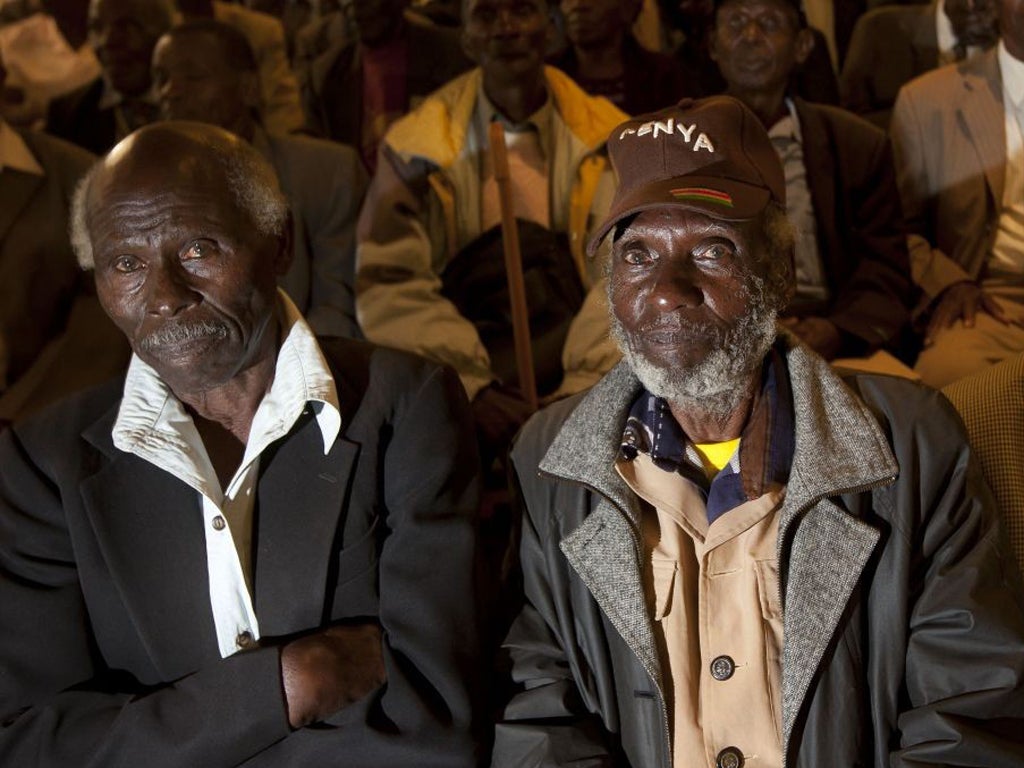Mau Mau victims compensation: There could yet be headaches for the British government
Not all those who suffered have been appeased by William Hague's offer

Your support helps us to tell the story
From reproductive rights to climate change to Big Tech, The Independent is on the ground when the story is developing. Whether it's investigating the financials of Elon Musk's pro-Trump PAC or producing our latest documentary, 'The A Word', which shines a light on the American women fighting for reproductive rights, we know how important it is to parse out the facts from the messaging.
At such a critical moment in US history, we need reporters on the ground. Your donation allows us to keep sending journalists to speak to both sides of the story.
The Independent is trusted by Americans across the entire political spectrum. And unlike many other quality news outlets, we choose not to lock Americans out of our reporting and analysis with paywalls. We believe quality journalism should be available to everyone, paid for by those who can afford it.
Your support makes all the difference.Yesterday’s move by the British Government to compensate some 5, 228 Mau Mau war veterans is bold and commendable.
The £2,600 individual restitution will serve as some closure for the elderly Kenyans who are all in their sunset days. Had the case been allowed to go to full trial, it would have taken a considerable amount of time to conclude.
It is anybody’s guess what would have happened to some of the claimants during this period.
In fact, one of the one of the four original claimants in the court case has since died. This prompted allegations that the British government was buying time with a protracted legal battle so that even when compensation is finally ordered by the court, there would be very few claimants remaining.
Thw najority of them might not have understood what William Hague told the House of Commons in English. They are also unlikely to grasp what the British High Commissioner to Kenya Christian Turner said at the press conference two days ago in Nairobi.
But through their educated children and grandchildren, they will know that London offered an apology – or something close to it. The money will then serve as evidence that indeed they have been compensated.
However, this is just one side of the story. In a case involving murder, rape, castration and detention, a figure of £2,600 is modest by any standards. Today this amount can buy just the roofing materials for a three-bedroom house in the rural areas in Kenya.
It cannot buy even a second-hand saloon car. If you want to start a business in a stall in Nairobi, you need twice that amount as goodwill to the landlord. To rent a stall in Nairobi costs an average of £460 a month. By the time you stock the shop, the £2,600 will appear as loose change.
From where I am seated, the offer to construct a multimillion-pound monument in honour of the veterans will be appreciated only at the national level. Most of the individual claimants will never see it since they live in various rural areas. My bet is it will be set up in Nairobi and very few of the veterans travel to the city.
In addition, thousands others are still disgruntled with the compensation deal. One of them is Eloise Mukami. This is the widow of Field Marshal Deddan Kimathi. Any Kenyan will comfortably tell you that she is the face of Mau Mau. She has not missed a single public holiday event where the independence heroes are honoured. Having a reserved seat close to the president has served to cement her place in the Mau Mau movement.
The chilling story of how Kimathi was hanged by the colonialists for his fight for independence is taught at the very elementary level in Kenyan schools. After the compensation story broke out a week ago, she addressed a press conference in Nairobi where she trashed the deal. That a deal to appease the Mau Mau left her out surprised many Kenyans. I believe there are many genuine cases which were sidestepped in this deal. That does not augur well for Her Majesty's Government.
Indeed, lawyers at Tandem Law (AVH Legal LLP), who are handling Ms Muthoni’s case and others, have already indicated stated that they would pursue their case to conclusion. Claims that these are opportunists have been diffused by the fact that Muthoni is one of their clients.
If they take time in arranging their case, I predict Tandem Law could end up with a strong case that might be a headache for the British government. Consequently, London could have taken time to seal a more comprehensive deal.
Kenfrey Kiberenge is a journalist for the Sunday Nation newspaper in Kenya
Join our commenting forum
Join thought-provoking conversations, follow other Independent readers and see their replies
Comments